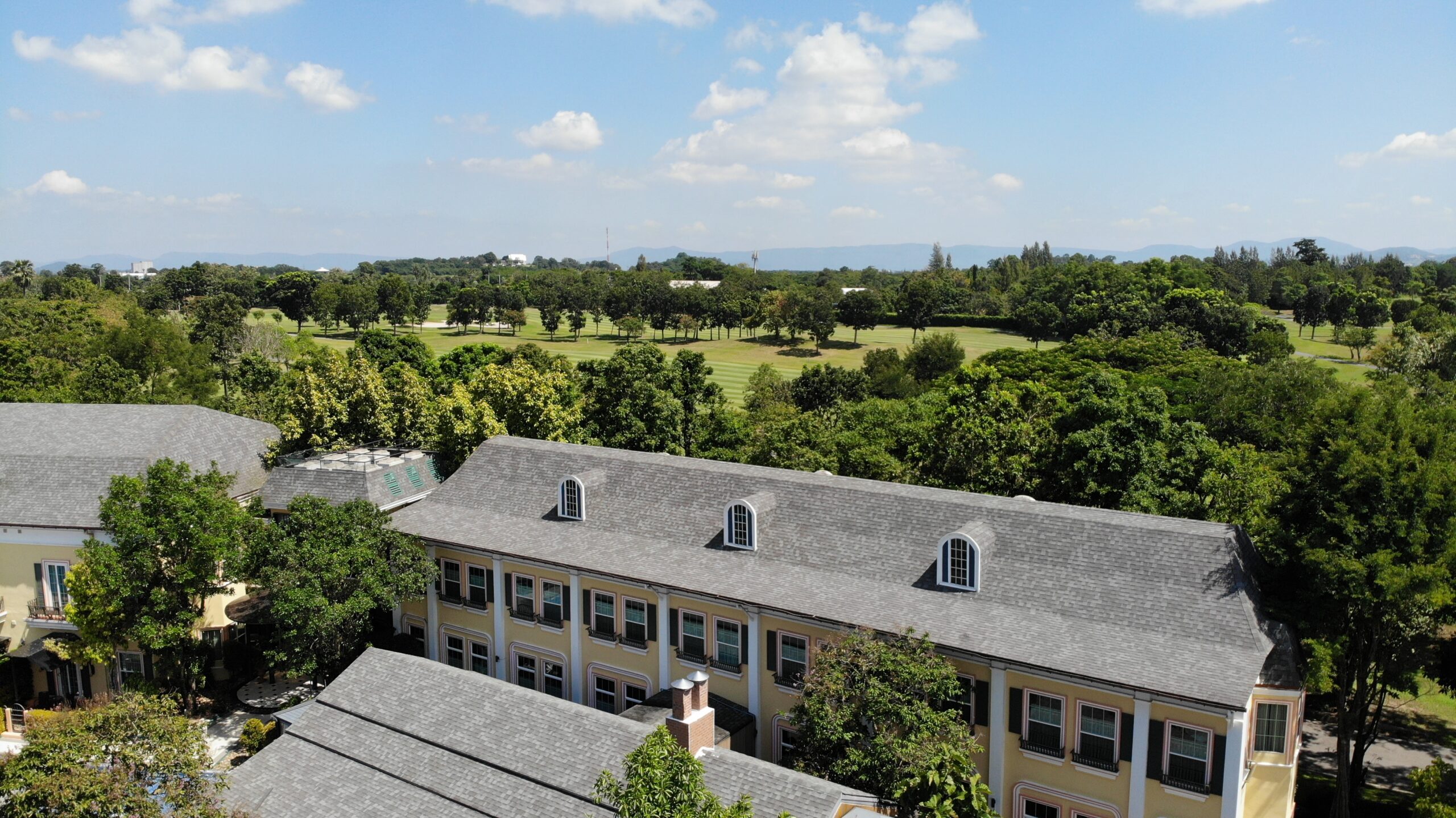How to Maintain Your Beadcrete Pool in Tropical Climates
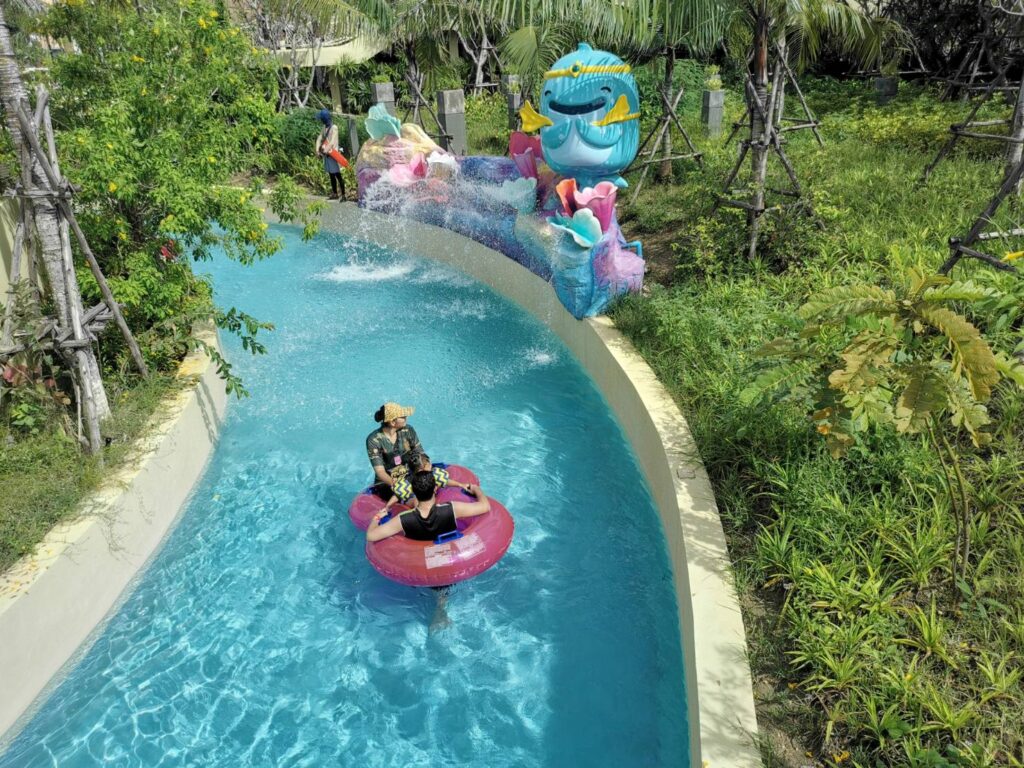
Maintaining a Beadcrete pool in Southeast Asia’s tropical climate requires specialized knowledge and techniques that go beyond standard pool care. Whether you’re managing a luxury resort in Thailand, a boutique hotel in Cambodia, a private villa in Vietnam, or an exclusive retreat in the Maldives, proper maintenance is essential to preserve your investment and ensure your Beadcrete finish continues to sparkle for decades.
At Civil Master International, we’ve maintained Beadcrete pools across the region for years, learning how tropical conditions affect this premium pool finish. This comprehensive guide shares our expertise to help you protect your Beadcrete pool through monsoon seasons, intense heat, and high humidity while maximizing its lifespan and beauty.
Understanding Beadcrete Maintenance in Tropical Climates
Beadcrete’s glass bead composition makes it more durable than traditional finishes, but tropical climates present unique challenges that require proactive care. The combination of high temperatures, intense UV radiation, frequent rainfall, and elevated humidity levels can affect water chemistry, promote algae growth, and test even the most robust pool finishes.
The key to successful Beadcrete maintenance in Southeast Asia lies in understanding these environmental factors and adapting your care routine accordingly. With proper maintenance, Beadcrete can last 15-20 years, making it a valuable long-term investment for hospitality properties and luxury residences.
Daily Maintenance Essentials for Tropical Beadcrete Pools
Water Chemistry Monitoring
In tropical climates, daily water testing becomes crucial due to rapid changes caused by temperature fluctuations, rainfall, and increased evaporation. Monitor these key parameters:
Target Ranges for Tropical Climates:
- pH Level: 7.2-7.6 (ideal: 7.4)
- Total Alkalinity: 80-120 ppm
- Free Chlorine: 1.0-3.0 ppm
- Calcium Hardness: 150-300 ppm
- Cyanuric Acid (Stabilizer): 30-50 ppm
During heavy use and tropical conditions, test chlorine and pH levels two to three times weekly, and check alkalinity, calcium hardness, and total dissolved solids monthly.
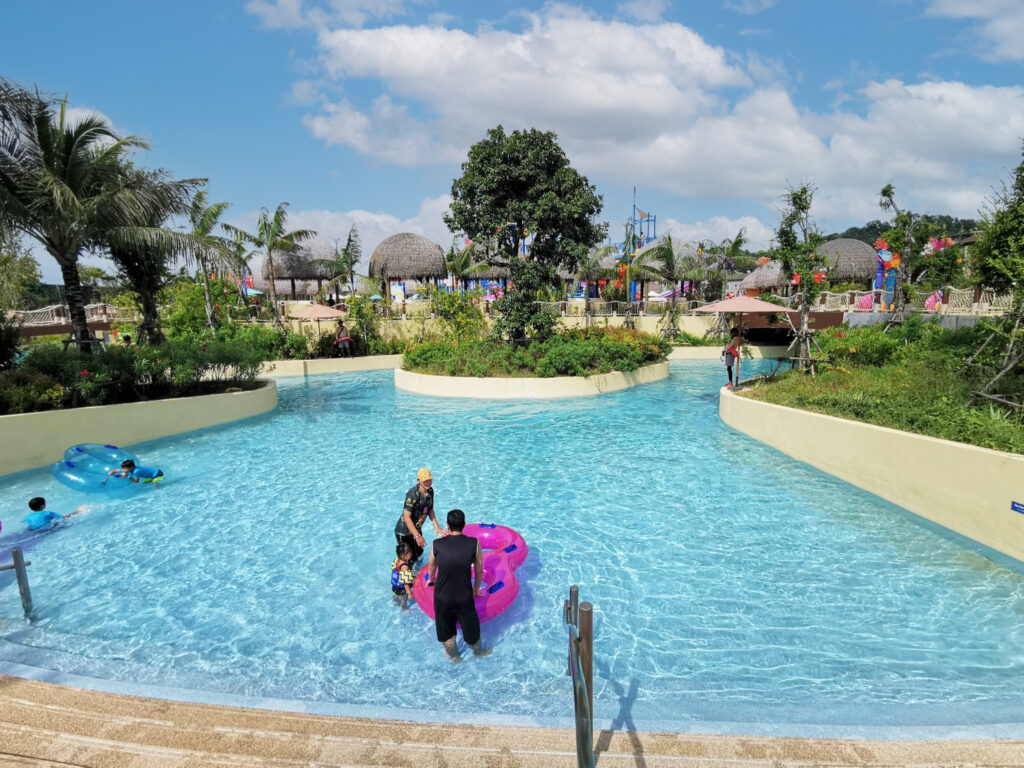
Surface Skimming and Debris Removal
Daily skimming is essential in tropical environments where falling leaves, flowers, and organic debris are constant. Beadcrete’s smooth surface makes debris removal easier than textured finishes, but prompt removal prevents:
- Organic matter decomposition affecting water chemistry
- Phosphate accumulation that feeds algae growth
- Staining from tannins in tropical vegetation
- Clogged skimmer baskets and reduced circulation
Use a fine-mesh skimmer net to capture both large debris and smaller particles that could settle into crevices around pool edges.
Circulation and Filtration Optimization
Run your filtration system 12-18 hours daily during peak tropical season. Extended operation helps combat:
- Higher evaporation rates requiring frequent water replacement
- Increased bather loads in hospitality settings
- Elevated temperatures promoting bacterial growth
- Debris from frequent tropical storms
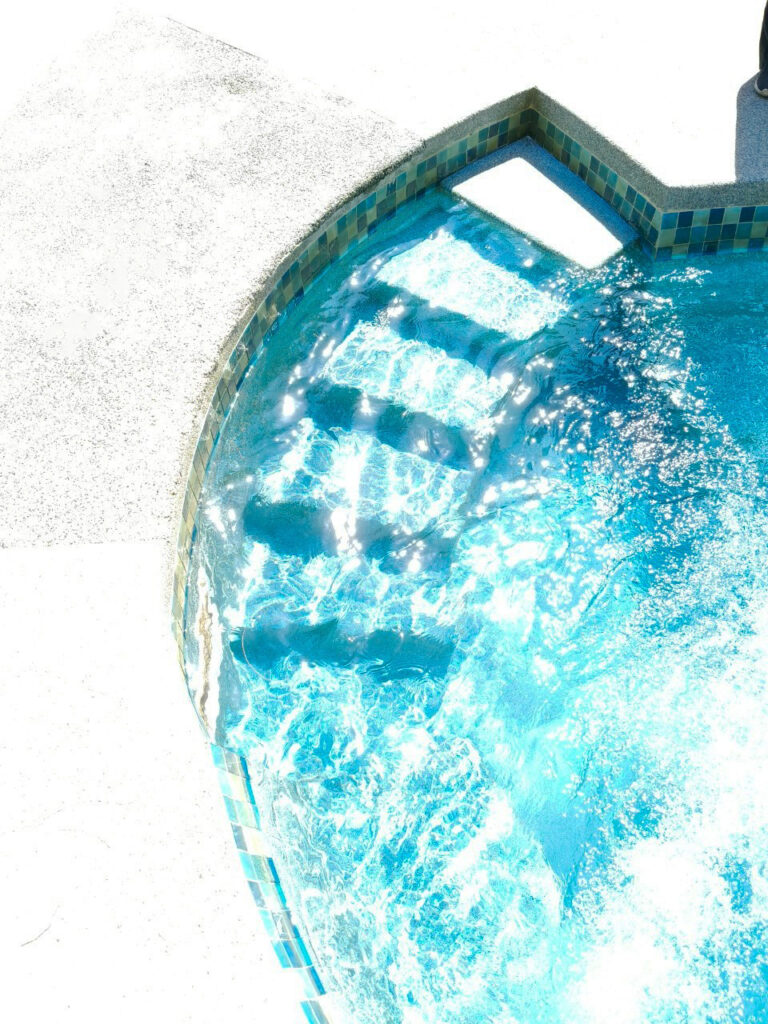
Weekly Beadcrete Care Routine
Gentle Brushing Technique
Unlike rough aggregate finishes, Beadcrete requires gentle brushing to avoid damaging the glass beads. Use a soft-bristled brush weekly to:
- Remove biofilm buildup before it becomes visible
- Prevent algae spores from establishing
- Maintain the reflective quality of glass beads
- Distribute chemicals evenly across the surface
Proper Brushing Method:
- Use light, overlapping strokes
- Brush walls from top to bottom
- Pay special attention to areas with less circulation
- Focus on steps, ledges, and corners where debris collects
Vacuuming and Deep Cleaning
Weekly vacuuming removes settled particles that daily skimming misses. In tropical climates, use:
- Automatic pool cleaners designed for smooth surfaces
- Manual vacuuming for thorough cleaning after storms
- Specialized vacuum heads that won’t scratch glass beads
Filter Maintenance
Clean or backwash filters weekly during tropical season, increasing frequency during monsoons or dust storms. Regularly backwash your filter and clean cartridges to maintain optimal performance, especially after monsoon storms.
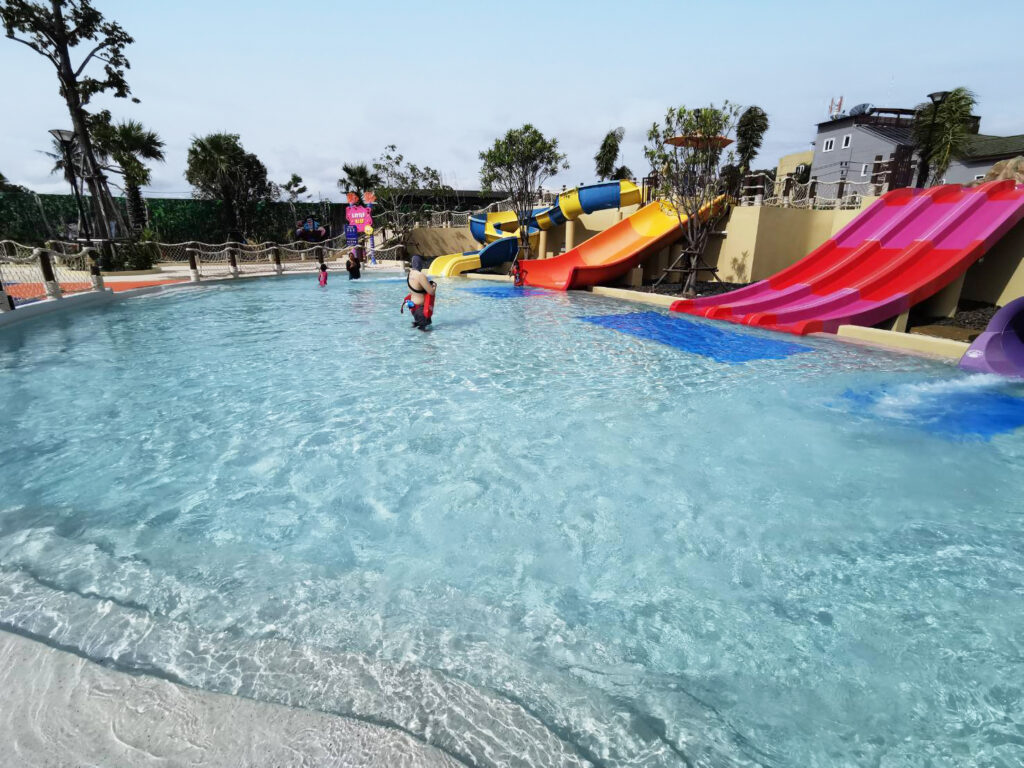
Seasonal Maintenance: Navigating Southeast Asia’s Climate Patterns
Dry Season Care (November-April)
During the dry season, focus on:
UV Protection and Evaporation Management:
- Monitor water levels daily due to increased evaporation
- Ensure adequate stabilizer levels to protect chlorine from UV degradation
- Consider pool covers during non-use periods
- Increase circulation during peak sun hours
Dust and Pollution Control:
- Clean filters more frequently in urban areas
- Use clarifiers to combat fine dust particles
- Maintain higher chlorine levels to oxidize pollutants
Monsoon Season Preparation (May-October)
Pre-Storm Preparation: Before storms arrive, ensure pH levels are between 7.2 and 7.5, secure loose items that could become projectiles, and lower water levels by a few feet to prevent overflow.
Storm Management:
- Reset filtration systems to run during typical storm hours (afternoon/evening)
- Apply preventative algaecide treatments
- Ensure adequate chlorine reserves for post-storm shocking
- Trim vegetation around pool areas to minimize debris
Post-Storm Recovery:
- Immediate Cleanup: Remove debris promptly to prevent staining and equipment damage
- Water Testing: Recheck chemical levels as acidic rainfall can dramatically change pH
- System Inspection: Verify all equipment functions properly before restart
- Extended Filtration: Run systems 24+ hours to clear residual particles
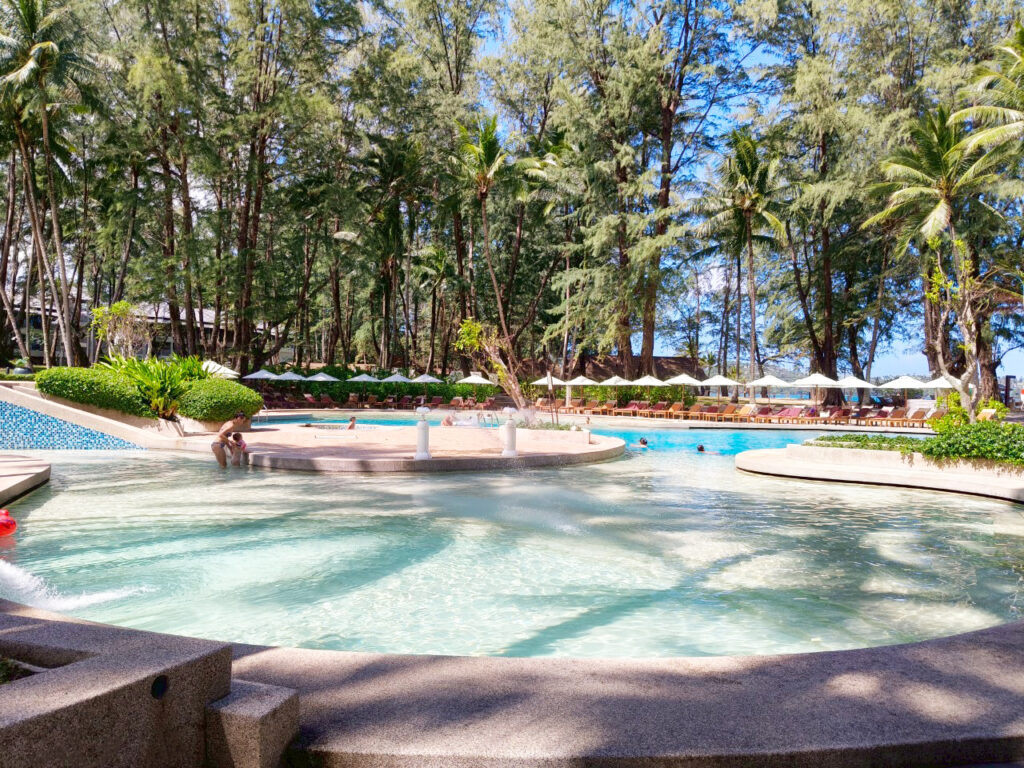
Preventing Common Beadcrete Problems in Tropical Climates
Addressing Bead Adhesion Issues
Corrosion & Abrasion are some of the biggest problems that Beadcrete pools face, where glass beads can become detached and fall to the pool bottom. In tropical climates, prevent this by:
- Maintaining stable water chemistry to preserve the cement matrix
- Avoiding aggressive brushing or cleaning methods
- Promptly addressing pH swings that can weaken bonding
- Using pool-specific cleaning equipment designed for glass bead surfaces
Color Preservation Strategies
Oxide-based colorants in glass beads can fade after about five years, especially when exposed to pool chemicals. Minimize fading by:
- Maintaining balanced water chemistry consistently
- Using stabilized chlorine to reduce UV impact
- Avoiding over-chlorination or chemical shocking unless necessary
- Scheduling regular professional inspections
Algae Prevention in Humid Conditions
High humidity promotes algae growth, but Beadcrete’s smooth surface helps resist colonization. Beadcrete resists algae growth and improves pool hygiene due to its non-porous surface. Enhance this natural resistance by:
- Maintaining consistent sanitizer levels
- Using phosphate removers to eliminate algae food sources
- Ensuring adequate circulation in all pool areas
- Applying preventative algaecides during high-risk periods
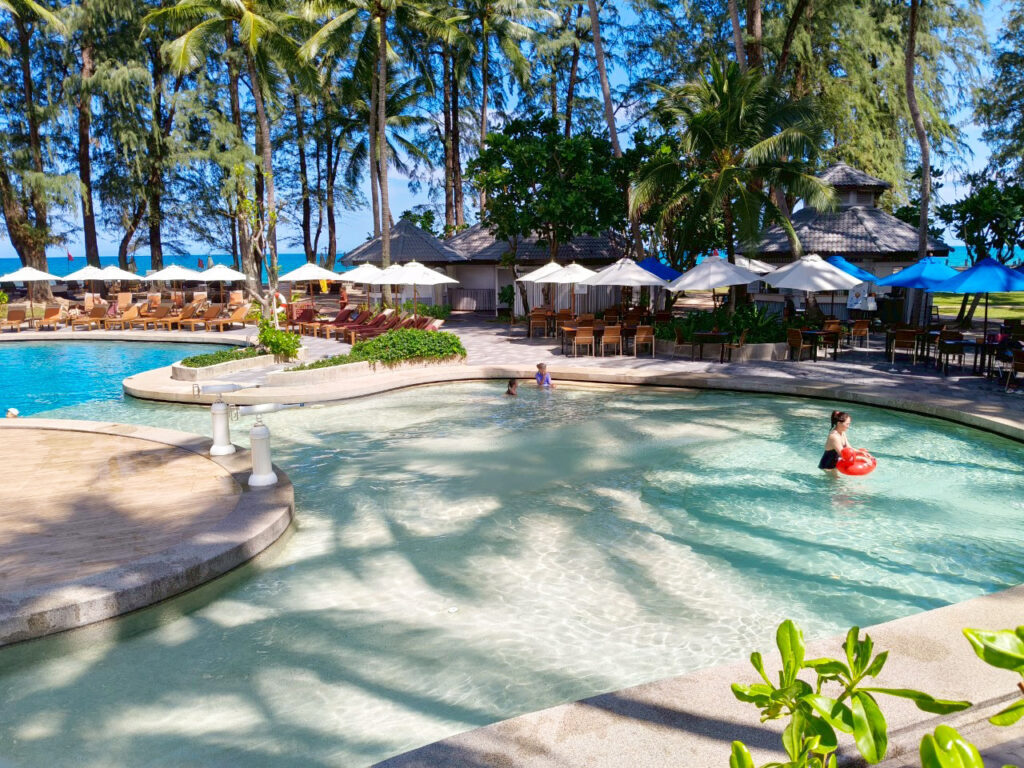
Professional Maintenance Services vs. DIY Care
When to Handle Maintenance In-House
Daily/Weekly Tasks Suitable for Property Staff:
- Water testing and chemical adjustment
- Skimming and basic debris removal
- Filter cleaning and equipment monitoring
- Routine brushing and vacuuming
Essential Training for Staff:
- Proper water testing techniques
- Chemical safety and handling procedures
- Equipment operation and basic troubleshooting
- Recognition of problems requiring professional intervention
When to Call Professional Services
Monthly Professional Services:
- Comprehensive water analysis with advanced testing
- Detailed equipment inspection and calibration
- Deep cleaning and specialized treatments
- Preventative maintenance on pumps, heaters, and automation systems
Immediate Professional Response Required:
- Persistent water quality issues despite proper chemical treatment
- Equipment malfunctions or unusual noises
- Visible bead detachment or surface irregularities
- Post-storm damage assessment and repair
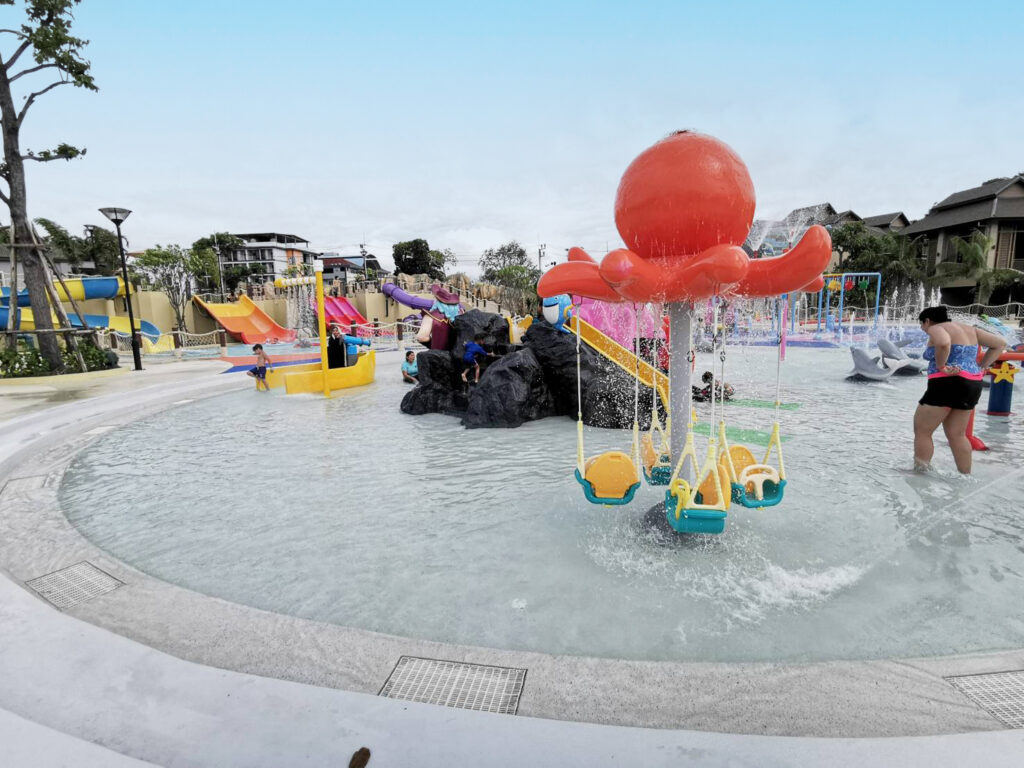
Advanced Water Chemistry Management
Dealing with Tropical Water Challenges
High Evaporation Rates:
- Monitor total dissolved solids (TDS) levels regularly
- Partially drain and refill when TDS exceeds 2,500 ppm
- Use calcium hardness increasers as needed with soft makeup water
Rainwater Dilution: Heavy rainfall can significantly impact chemical balance, requiring frequent testing and adjustment to prevent algae growth, cloudy water, and pH imbalances.
Temperature Fluctuations:
- Adjust chemical dosing for temperature-dependent reaction rates
- Monitor pH more frequently during rapid temperature changes
- Account for increased chlorine consumption in warmer water
Specialized Chemical Treatments
Phosphate Management: Use phosphate removers monthly to prevent algae food sources, especially important in tropical environments with abundant organic matter.
Metal Control: In areas with high mineral content in source water, use metal sequestrants to prevent staining and precipitation.
Enzyme Treatments: Monthly enzyme treatments help break down organic contaminants from sunscreens, body oils, and tropical vegetation.
Equipment Optimization for Tropical Conditions
Pump and Circulation Enhancement
Variable Speed Pumps: Optimize energy efficiency while maintaining adequate circulation during extended run times required in tropical climates.
Circulation Boosters: Install return line boosters in areas prone to dead spots, common around tropical pool features like beach entries and lagoon areas.
Filtration Upgrades
Cartridge vs. Sand vs. DE Filters:
- Cartridge filters: Excellent for Beadcrete’s fine particles, easy maintenance
- Sand filters: Durable in high-debris environments, require regular backwashing
- DE filters: Superior filtration quality, ideal for luxury hospitality properties
UV Sterilization: Consider UV systems as supplementary sanitization to reduce chemical dependence in high-bather-load situations.
Automation and Monitoring
Smart Pool Systems:
- Remote monitoring capabilities for multi-property management
- Automated chemical dosing systems for consistent water balance
- Weather-responsive programming for storm preparation
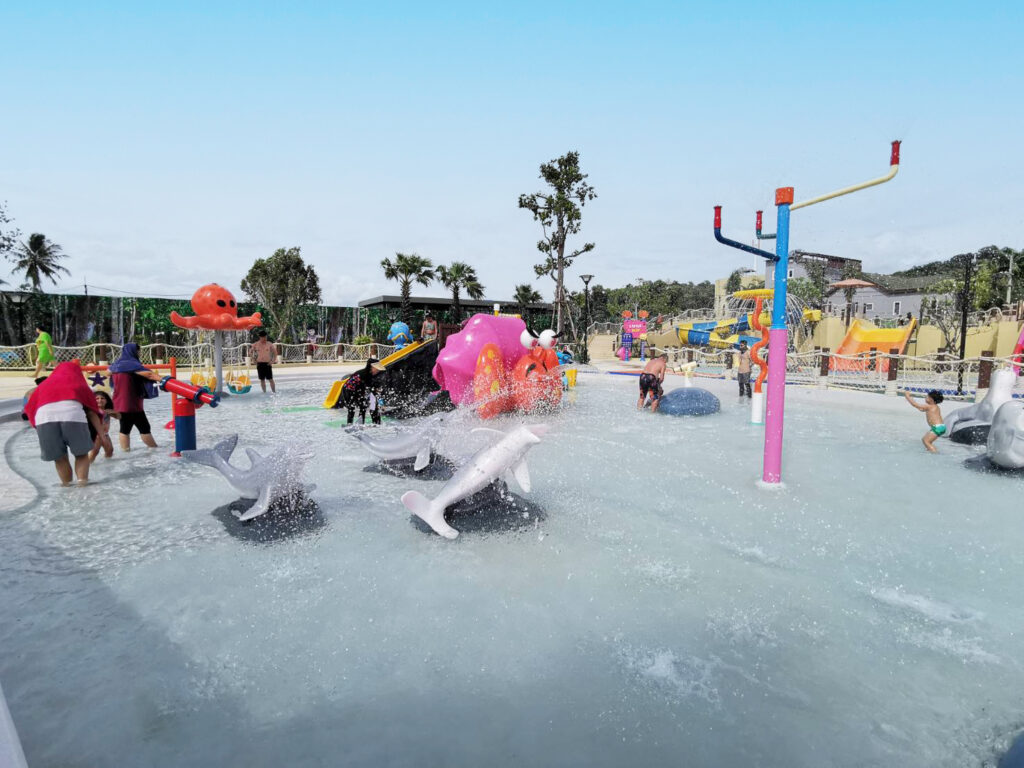
Troubleshooting Common Tropical Climate Issues
Cloudy Water Solutions
Causes in Tropical Climates:
- Fine dust and particles from dry season winds
- High organic loads from vegetation and rainfall
- Inadequate filtration during peak debris periods
Solutions:
- Increase filtration runtime
- Use clarifiers or flocculants as needed
- Clean or replace filter media
- Check and adjust water balance
Green Water Recovery
Rapid Response Protocol:
- Test and balance pH immediately
- Shock treat with calcium hypochlorite
- Run filtration continuously until clear
- Clean filter media frequently during treatment
- Vacuum waste to prevent recontamination
Surface Staining Issues
Common Stain Sources:
- Metal precipitates from source water
- Organic stains from tropical vegetation
- Sunscreen and cosmetic residues
Removal Techniques:
- Ascorbic acid treatments for metal stains
- Enzyme treatments for organic residues
- Professional acid washing for persistent staining
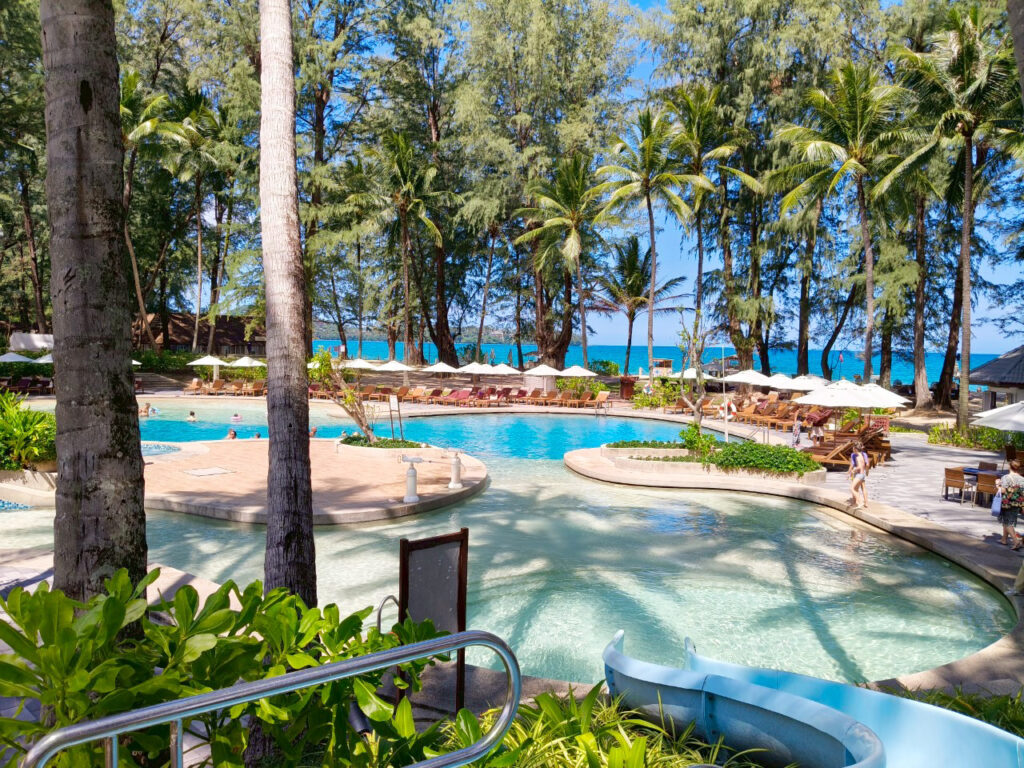
Annual Professional Maintenance Requirements
Comprehensive Surface Inspection
Annual Assessment Should Include:
- Detailed examination of glass bead adhesion
- Evaluation of color retention and uniformity
- Assessment of surface smoothness and integrity
- Documentation of any wear patterns or problem areas
Deep Cleaning and Restoration
Professional Services:
- Acid washing to remove buildup and restore luster
- Specialized cleaning treatments for glass bead preservation
- Minor repair work for any surface imperfections
- Protective treatments to enhance longevity
Equipment Overhaul
- Complete pump and motor servicing
- Filter system deep cleaning or replacement
- Heater descaling and efficiency testing
- Automation system calibration and updates
Cost-Effective Maintenance Strategies
Preventative Care Investment
Long-term Cost Savings:
- Daily water testing prevents expensive correction treatments
- Regular filter maintenance extends equipment life
- Prompt debris removal prevents staining and deep cleaning costs
- Professional inspections catch problems before they become major issues
Bulk Chemical Purchasing
Hospitality Property Advantages:
- Negotiate better pricing with chemical suppliers
- Maintain adequate inventory for storm season
- Train staff in proper storage and handling procedures
Energy Efficiency Optimization
- LED pool lighting reduces heat load and electrical costs
- Variable speed pumps lower operational expenses
- Pool covers reduce evaporation and chemical consumption
- Smart automation systems optimize energy usage patterns
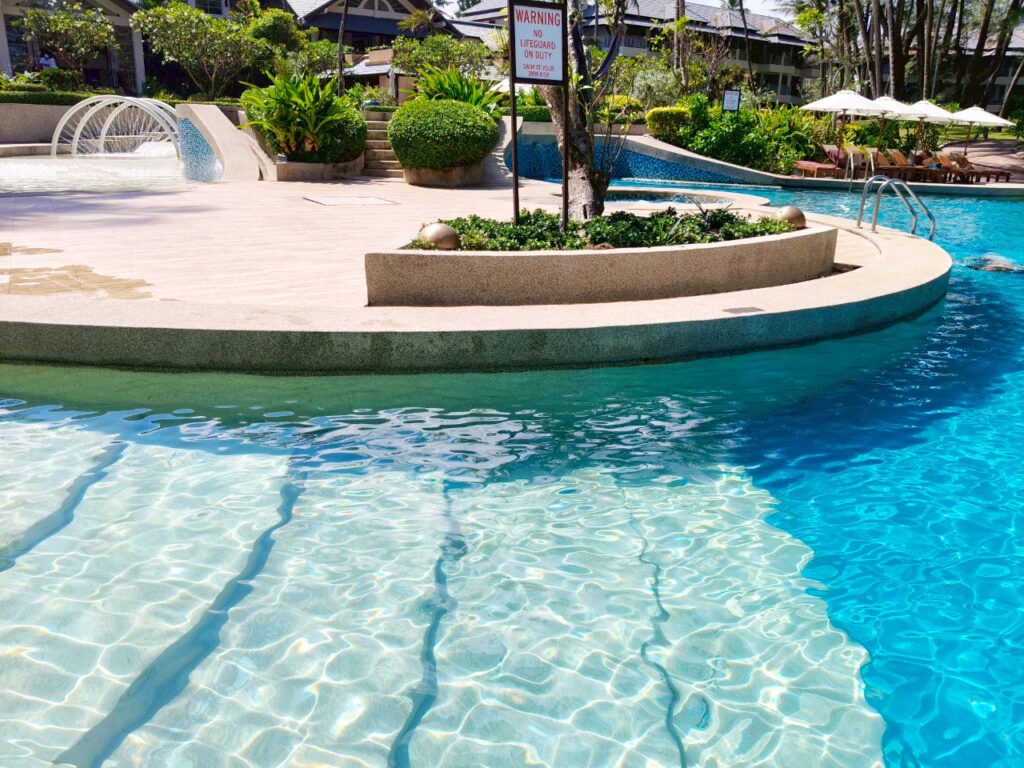
Training Your Maintenance Team
Essential Skills Development
Basic Competencies:
- Water testing and interpretation
- Chemical safety and application procedures
- Equipment operation and routine maintenance
- Problem identification and escalation protocols
Advanced Training Areas:
- Storm preparation and recovery procedures
- Energy-efficient operation techniques
- Guest safety and pool area management
- Equipment troubleshooting and minor repairs
Civil Master International: Your Beadcrete Maintenance Partner
Comprehensive Service Solutions
As Southeast Asia’s leading Designer Concrete Coating specialists, Civil Master International offers complete Beadcrete maintenance solutions tailored to tropical climates:
Service Offerings:
- Regular maintenance contracts for hospitality properties
- Emergency response services for storm recovery
- Annual inspection and restoration programs
- Staff training and consultation services
- Water chemistry management systems
Regional Expertise
Our teams understand the unique challenges of maintaining Beadcrete pools across:
- Thailand: Managing monsoon season impacts and high temperatures
- Singapore: Coastal salt air considerations and humidity management
- Maldives: Salt water intrusion and coral sand contamination issues
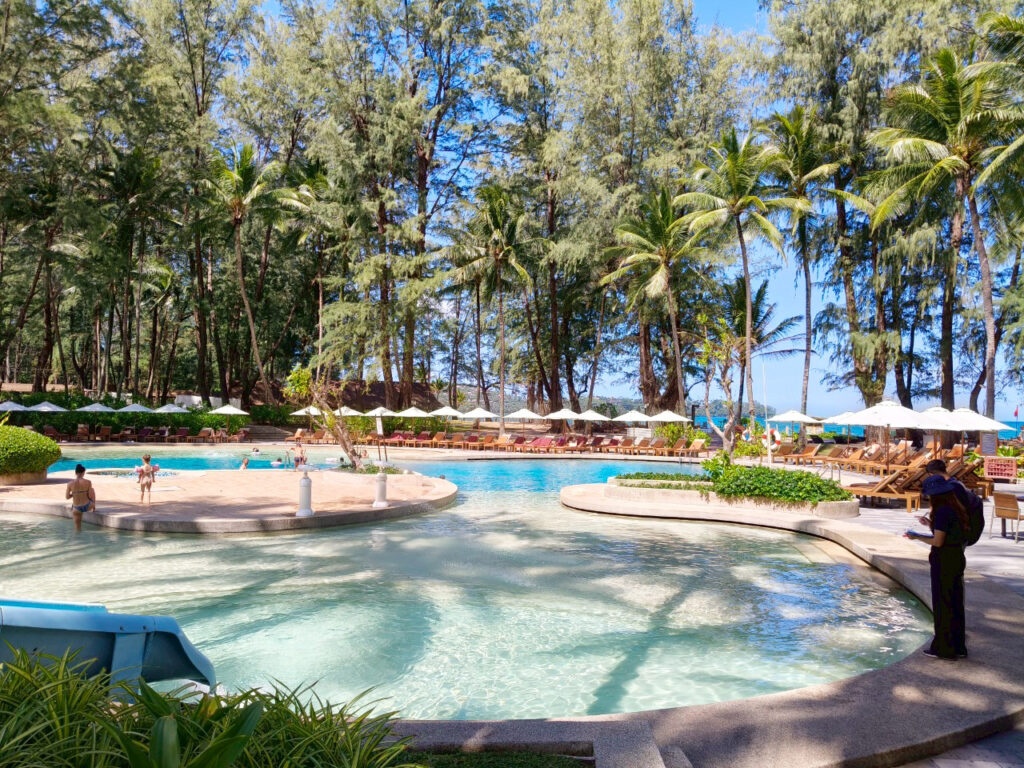
Technology Integration
We employ advanced maintenance technologies:
- Digital water testing and tracking systems
- Remote monitoring capabilities for multiple properties
- Predictive maintenance scheduling based on usage patterns
- Emergency response protocols for extreme weather events
Seasonal Maintenance Calendar for Southeast Asia
Monthly Task Schedule
January-March (Cool/Dry Season):
- Focus on dust control and UV protection
- Deep clean filters monthly
- Monitor evaporation rates closely
- Inspect equipment for dry season wear
April-June (Hot Season):
- Increase chemical testing frequency
- Extended filtration run times
- Monitor for heat-related equipment stress
- Prepare for monsoon season
July-September (Peak Monsoon):
- Storm preparation protocols
- Frequent debris removal
- Enhanced water chemistry monitoring
- Equipment protection measures
October-December (Post-Monsoon):
- System recovery and deep cleaning
- Annual inspection scheduling
- Equipment maintenance and repairs
- Preparation for next cycle
Conclusion: Protecting Your Beadcrete Investment
Maintaining a Beadcrete pool in Southeast Asia’s tropical climate requires dedication, knowledge, and the right approach. By following these comprehensive maintenance guidelines, you can ensure your glass bead finish continues to sparkle and perform beautifully for decades.
Key Success Factors:
- Consistent daily monitoring of water chemistry and debris removal
- Proactive seasonal preparation for weather pattern changes
- Professional partnerships for specialized services and emergency response
- Staff training to handle routine maintenance effectively
- Quality equipment designed for tropical operating conditions
The investment in proper Beadcrete maintenance pays dividends through:
- Extended surface lifespan (15-25+ years vs. 7-12 years for standard finishes)
- Reduced long-term repair and replacement costs
- Enhanced guest satisfaction and property value
- Minimized downtime and operational disruptions
Whether you’re managing a single luxury residence or multiple hospitality properties across Southeast Asia, Civil Master International stands ready to help you maximize your Beadcrete investment. Our regional expertise, advanced maintenance techniques, and comprehensive service solutions ensure your pools remain stunning showcases that reflect the quality and attention to detail your guests expect.

Contact us today to develop a customized maintenance program that protects your Beadcrete pools through every season and weather challenge Southeast Asia can present.
